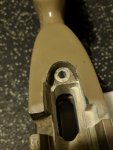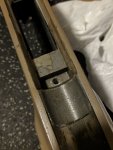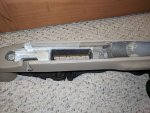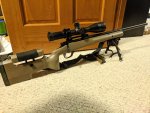I would hold off on bedding until I had some actual symptoms of a badly bedded/unbedded barrelled action (If it ain't broke, don't fix it...). New guys will pretty much always always overthink things, and in some ways, get carried away chasing problems that may or may not actually exist. I think it's rather obvious that any bedding issues, if actually present, aren't degrading this rifle's accuracy. For me, that simple fact tends to cast significant doubt on any need for bedding work at this time.
But since you appear to have your heart set on it, the gunsmith bedding deal you've been offered sounds like a good one; especially since by having a pro do it, there shouldn't be any lingering doubts due to mistrust of one's own abilities. Peace of mind is always cheap at twice the price, no matter what it costs.
....And before it starts, take a moment to make up your mind never to blame the gun for a bad target until one has actually managed to reliably rule out operator error. My gear is, with only one exception, basic factory rifles upgraded with very simple and non-customized accessories. When things go South I can almost generically start by assuming operator error on my part, there's so little else that can go wrong.
I have made it my basic rule to stick with factory equipment and simple, very basic accessories. That way, when the shooting is good, I can usually know that the likelihood is good that the excellence comes from me, and not the gear. Better gear will only make an accomplished shooter do better. It can not save the day when the skills are deficient. As I was taught when I started with National Match Highpower Competition, nobody can buy their way into the "X" Ring.
Start every troubleshooting exercise by going over the usual suspects, loose mounts and stock screws. It makes even better sense to do the same troubleshooting exercise just prior to your shooting sessions; this will eliminate any uncertainty about how the system was set up when the outing began.
As a newer precision shooter, you are developing and honing the skills which will serve you for a long time. Now is the time to establish some ground rules for yourself. You can go two ways; either making yourself dependent on custom (and costly) equipment specialization, or developing versatile skills which are impervious to the larger variances that exist in the real world.
I prefer to do the latter first.
I think it's better to get proficient with triggers both light and heavy, so the differences do not impede your growth. Later, you can apply that versatility to lighter triggers. Save all that money earned from resisting impulses to refine the equipment, and apply it to more ammunition and range time.
To my mind, trigger manipulation is the most key single aspect of what I do when I am shooting for precision. Get that right and most everything else gets a lot easier. Let yourself rule the trigger and not let the trigger rule you.
IMHO, the best beginner/trainer rifle will be very generic, basic and uncomplicated, simple to the point where one one becomes so well versed in its use, that good basic skills will exist that are so much better prepared to take advantage of finer and finer equipment refinements. It will be robust and reliable, and not subject to the frailties or complexities of highly refined parts and accessories.
Recognize also that every specialized refinement you incorporate into your equipment will make it less and less likely to be marketable to the larger audience, and that when you do eventually part with it, will represent a significant expense that you will miss dearly and probably need to reinstitute on the newer replacement. If you take off original parts a part of any upgrade, as long as they are serviceable, keep them, and put them back on when offering the equipment for sale. The more generic rifle will sell quicker, and the upgrade parts will usually bring more money off the rifle than on it.
And finally, the more complex the rifle becomes, the more prone it becomes to equipment failure. KISS (Keep It Simple, Stupid) approach means that the performance is based on skills that aren't dependent on specialized equipment features, which can allow the shooter to pick up virtually any rifle and either shoot it great, or give a good diagnosis of where the equipment is failing. Making the performance equipment dependent means there will be other equipment that will not provide that shooter with the same good performance.
In the end, this process you are inaugurating should be independent of specific features. It has to be, or the skills present in the final outcome will not be as robust and self sufficient as, for instance, I would want mine to be.
The rifle you have, unless there is some underlying flaw, and I consider that very unlikely, should be all the refinement you should need until it becomes abundantly clear that the equipment is the sole remaining impediment to perfecting your performance.
Greg






















